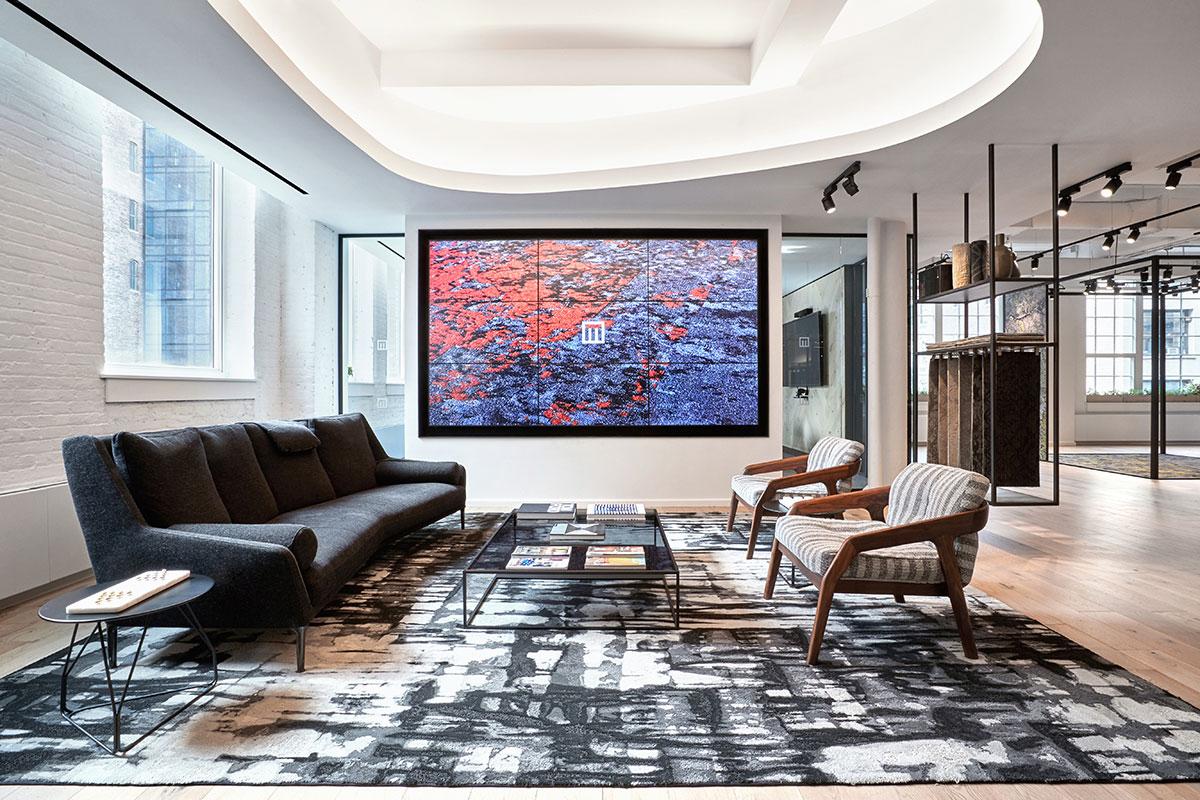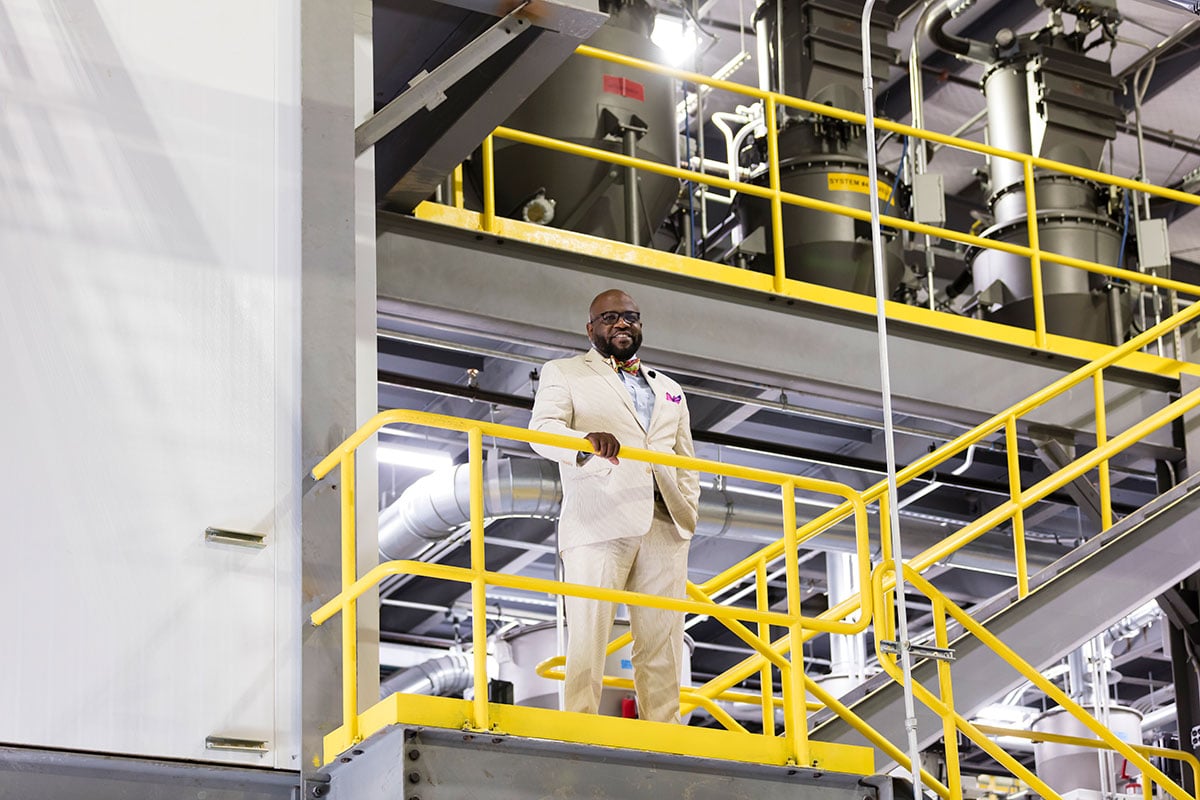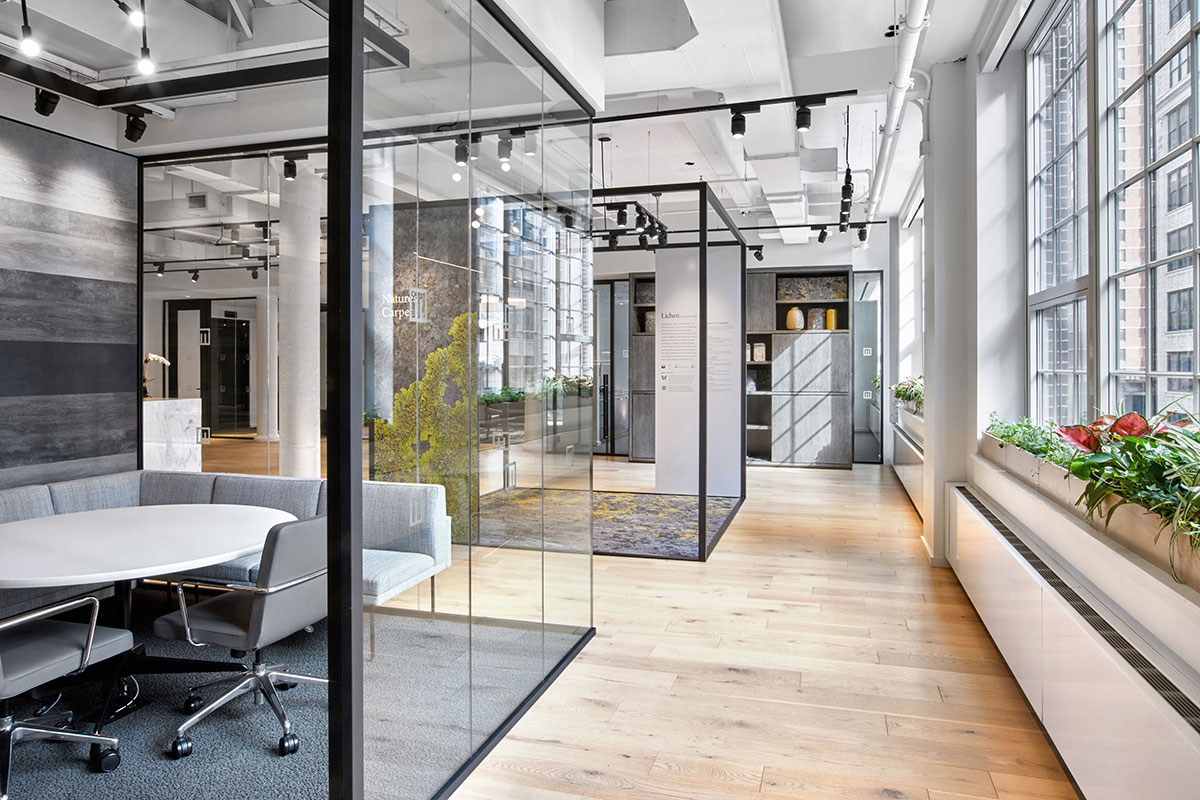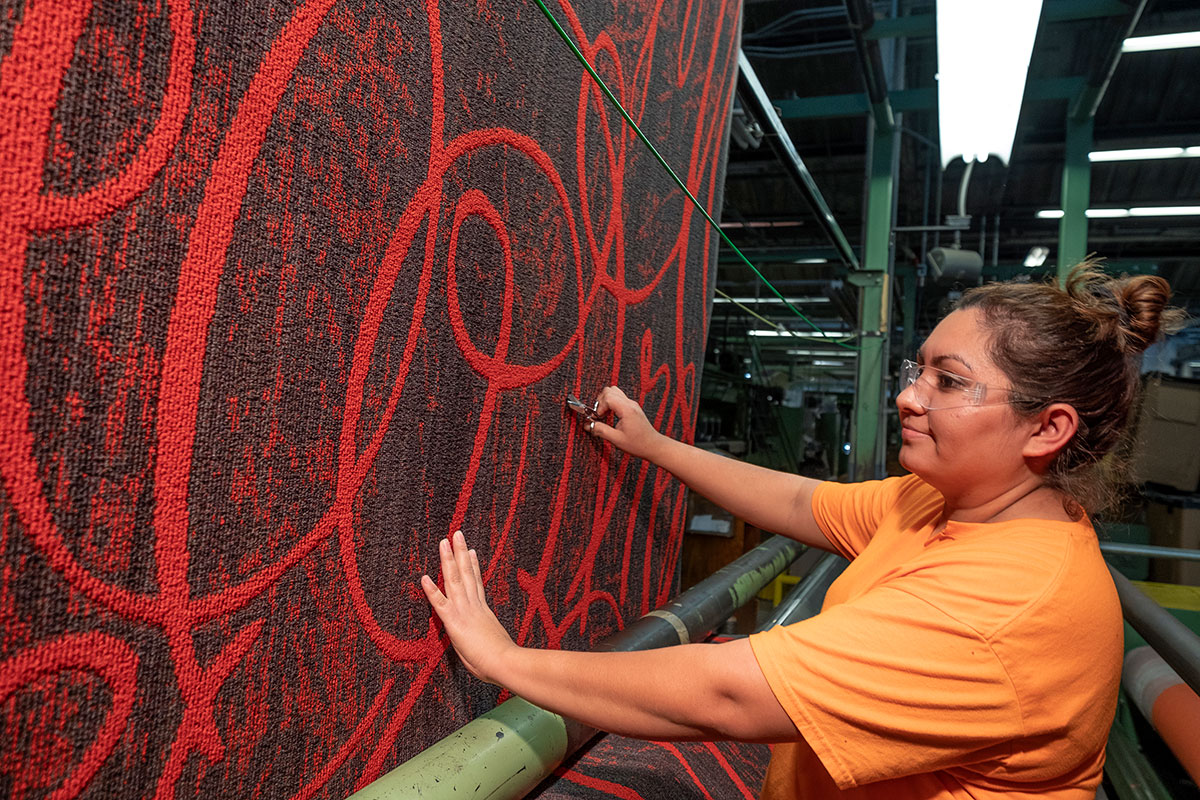Discovering new Living Products with Mohawk, who continues to pioneer in the world of sustainable flooring.

This New York City showroom shows off some of Mohawk Industries’ most beautiful flooring products.
Photo by Garrett Rowland
Mohawk Industries is the largest flooring manufacturer in the US, but their leadership doesn’t stop there. In recent years their sustainability efforts have exploded under the guidance of Mohawk Flooring North America Chief Sustainability Officer George Bandy, Jr. He’s helped set and execute the company’s vision on sustainability in response to changing consumer trends. “We know the buyer today is a much more educated buyer than 10 years ago,” he says. “They expect us to move in a sustainable pathway … They expect that. We’re sharing with them that we hear them, and we’re demonstrating our actions by delivering solutions and being responsible in the way we do it.”
Mohawk has doubled down on that commitment. They’ve undertaken a massive effort to produce hundreds of Living Products stringently certified by the International Living Future Institute (ILFI) as products that do more good than harm to the environment—the idea of leaving more social “handprints” than environmental footprints. They’ve opened showrooms across the world that meet countless aspects of the Living Building Challenge and LEED and WELL standards. And they support other flooring companies who are trying to do the same. “We don’t get to compete for Mother Nature. We don’t. It’s an unfair evaluation, it’s an unfair assessment,” Bandy says. “We’re trying to be a small part of a large ecosystem of industrial design. That’s all we’re trying to do. And if we do our part and convince others to do their part, I think we will have a significant impact.”

George Bandy, Jr. says there’s a great sense of pride and innovation inside Mohawk’s Virginia plant.
Courtesy of Mohawk Group
Design
The push for Living Products began when Mohawk released its Lichen Collection in 2017. “It was a raging success,” Bandy says. “Lichen outsold every product we launched at NeoCon in the history of Mohawk.” But Bandy knew they couldn’t just offer a limited supply of Living Products—they needed to work with ILFI to strategically scale up. They reworked their entire process at their carpet tile production facility in Glasgow, Virginia, working to reduce energy consumption, eliminate surprisingly common Red List chemicals, and establish environmental and community benefits to outweigh any costs associated with the production of their products.
Bandy gives a huge amount of credit to the manufacturing team at Glasgow. “Usually the manufacturing culture doesn’t want to change … You’ve got to go back through the supply chain; you’ve got to meet with the supplier; all of this stuff becomes a challenge,” he says. It was a challenge Mohawk met head on. “In three years we’ve got a manufacturing facility with Red List–free solutions and Living Products in every aspect. We have a sense of pride and innovation and creativity inside of that plant,” he says. Thanks to the reworked design process, what began as a single Living Product has expanded to an offering of more than 300. Now being the genesis of a full carpet tile platform of Living Products, Mohawk refers to this plant as its “Living Site.”

Photo by Garrett Rowland
Sustainability
Mohawk’s Glasgow facility and many of its showrooms not only produce and display these sustainable products—the spaces themselves are sustainable. When new clients approach a Mohawk showroom looking to build an eco-friendly space for themselves, Mohawk is ready to help. “We give them a platform to come and experience our products and experience our people and experience our space so they can then see the space and feel the space for what it is they’re trying to accomplish,” Bandy says. Mohawk showrooms all over the world, including an upcoming showroom in Toronto, meet many of the certifications clients themselves are trying to achieve, including LEED and the WELL Building Standard. “What we’ve done is work to make these spaces more in tune with the direction the industry is moving,” Bandy says.
At the Glasgow plant, he says, “It’s not just about the product; it’s about the people who are making the product.” The plant sits on a national wildlife habitat and features walking trails and healthy life centers for the benefit of employees. “The people who work there love the place they work in,” Bandy says. The surrounding community benefits from the plant as well, with environmental impacts rippling out as part of a larger social impact “handprinting” strategy. “So when Morehouse College in Atlanta saves money and water because we have replaced their showerheads … and we have them use a certain percentage of that savings for another project, and they go out and do an LED retrofit of their most energy inefficient building—that’s a gift that continues to give.”
Additional social impact strategies include a 10-unit solar energy program that has already “planted” smartflower devices in Chicago, Florida, Georgia, and North Carolina. Through this initiative, Mohawk is hoping to make a difference in underserved communities and at schools with STEM programs. Each unit optimizes the generation of solar energy using modular petal-shaped panels that autonomously follow the sun. By following the sun’s rays, smartflowers generate 40% more energy than static solar panels.

What began as a single Living Product has expanded to an offering of more than 300 from Mohawk.
Photo by Kevin Blackburn Photography
New Products
All this work continues to yield exciting new products. Mohawk’s Relaxing Floors Collection is a new Living Product that promises to bring the benefits of nature into the built environment. The patterns on the carpet tiles are based on research linking fractals to stress reduction. These repeating, organic patterns are found throughout nature, and the carpets capitalize on the same concept. “It’s random. Nature is random. It is no different than you seeing branches on a tree or leaves on the ground or sand on the beach. And there’s a certain level of relaxation that comes with that,” Bandy says.
A new collection based on the plumage of owls similarly builds on the natural world, this time designed in partnership with Lichen collaborator Jason McLennan. “It’s all about looking at the owl’s feathers and the owl’s characteristics and designing that within a floor to create another biophilic connectivity to nature,” Bandy says. While Relaxing Floors stole the show at NeoCon, Mohawk is hoping to do something similar at Greenbuild in Atlanta in November 2019. The collection will represent Mohawk’s first official product launch to-date at the international exposition.
Just as Mohawk began its Living Product push with a single commercial collection in 2017, this year they are continuing to build on and explore super sustainable product platforms in the residential sector. The Air.o unified soft flooring line production process takes used water bottles and transforms them into durable, hypoallergenic residential carpets that are themselves fully recyclable thanks to the fact that they are made of a single material. Mohawk already recycles 6.2 billion plastic water bottles every year to produce the material, and “this particular solution is really plastic bottles being turned into carpet, and carpet being turned back into plastic bottles,” Bandy says. It’s an exciting new line, reminiscent of Lichen’s transformational launch back in 2017 and reflective of Mohawk’s ongoing commitment to a more circular economy.


